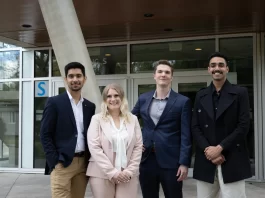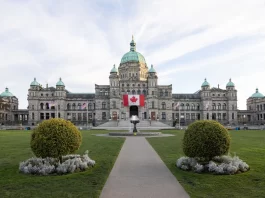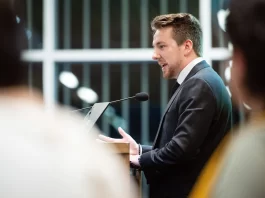Interviewed by Dessa Bayrock.
Since many students will be voting or taking an interest in municipal politics for the first time, what would you describe as the role of municipal politics? What can city councillors actually do?
I’m hearing a lot of this question recently and I’m not surprised, based on the voter turnout results that we keep seeing put in the news, and even my own experience growing up. The city: it’s all about how you run the city. Municipal waterways, the roads that are actually in the city outside of the highways, which are provincial or federal jurisdiction, bylaws for animal control and other items like that, and then just in general, the feel of how you run your city, what it looks like, so, a lot of stuff like that.
Who do you view as your constituents?
Everyone who lives and works in Chilliwack. A lot of the working [population] gets forgotten about in lieu of people focussing only on the taxpayers for the property tax, etcetera, but you still gotta pay the water tax, so that gets paid for by the landlords and so on as well, so if you work here, you’re all part of that as well.
How will you receive the views of the entire population instead of just those most active around City Hall?
Engagement. That is always the important one. So we always need to be receptive. And to me, the city website is not living up to its mandate for this one. So it doesn’t mean we still don’t need to get out there and speak to people in person one on one, but the city website should be a resource that we are putting out there for people to be able to go to, put their questions on there, get their answers. It’s got a lot of information, but that questions and answers part is a big one and it’s missing. We’ve got the ability to go to Facebook, we’ve got the ability to go to Google and put in questions there. We’ve got a basic search feature on the city website, but you can’t actually ask a question on the city website and then get someone from the city to give you an answer. You have to send an email. And it’s a dead-end on whether or not you’re sure you’re going to get a reply, and then no one else can see that someone else has asked a similar question and get an answer. So where’s the frequently asked questions part of it?
So to me, it’s – we haven’t evolved with the times. That we have the ability to do all this now, and it’s past time we do it.
Are you doing anything to address the lack of student interest in local politics?
I haven’t necessarily done anything yet. But to me a lot of this stuff goes hand in hand: if we fix the city website and the ability to engage through there, and provide a lot of other services and so on – to me this is almost a school trustee question, in a way, but a lot of the focus of the school trustees is actually at the elementary school level. And if you can get the interest in from a younger age then we can get it going. For me we have to look at getting voters engaged earlier. The youth are the future. So I’ve had a comment I’ve put on for a similar question to this: Mayor Gaetz posted a link about possibly dropping the voter age to 16. The article was actually misleading in a way in that they were saying, well, we should allow them to register but maybe not let them until they’re 18 still. I still don’t know why it’s not 13, to be honest. Why aren’t we letting 13- to 18-year-olds vote for their school trustees? They’re the ones who are in charge of their ability to get their education done and provide them with the basics to get into university and so on. So. And the same thing applies at the university. Why isn’t there a school trustee specific to the universities? Why is it capped out just at there? So this is stuff that the local council could be pushing towards for bylaw changes and guidelines at the provincial level. And even just with the voter engagement: a lot of people are using online again, and BC is behind the times not offering online voting options. There’s a specific bylaw in place preventing even mail-in voting. That, to me, is also outdated. Why are we not allowing mail-in, let alone modern options of electronic voting, be it telephone or just a simple web form where we can cast our vote?
So in terms of a specific 18 to 24-year-old university student demographic, are you doing anything to address their general lack of interest in local politics? Or do you intend to do anything?
I would definitely love to do something. Do I have any specific ideas outside of stuff I’ve already mentioned about website and access to information? Nothing specific comes to mind but I’m definitely open to ideas. And that’s one thing I’ve been waiting for a chance to do, is actually get in contact with people and find out some of their ideas and see what we can do with them. A lot of the things I’m seeing so far for questions that have been asked – there’s a confusion of what does a local politician do versus a federal and provincial. There’s a lot of grey area and some overlap in the areas, and there’s some where it’s clear-cut: this is provincial and that’s a federal matter, and then a few that are local. So again, to me, I go back to the question: why don’t we have a school trustee out there for college and university students? In this case, in Chilliwack, it’s going to be specifically the University of the Fraser Valley. We have one for all, again, the high schools and middle schools and elementary schools. Where’s the representative here for the university? They should be getting a voice as well.
If elected, how would what you want to do as councillor be different from what council is already doing?
Again, to me, engagement through the web and transparency as a result. Council, while they do a lot of good currently, is still behind the times. The City website, while it’s nice that we’ve got one – again, where’s the forum? Where’s the engagement through it? Another example that came to mind recently with the dog park sign that the mayor is pushing out. It was nice that they came out and are doing that, but the contact information on that sign is a phone number. It’s nice that we can call it, but where’s a website that we can go to, to see the bylaws applicable to the area, get more information on stuff? And another one was the City’s new sign when you go in and out of the city. Why couldn’t we have engaged the public on picking a design for that one, and decided whether or not we wanted advertising on it to help pay for the cost and help get revenue into the city? So I’m not seeing a lot of questions like this being asked in council meetings, either. I know they don’t do a lot of debate during the meetings, and it’s done behind doors. Again, that needs to get changed and we need to see some of this debate going into the stuff, into the decisions, so that people see how the stuff got to get to where it did to get to the actual voting stage.
Do you have a specific project you want to prioritize or bylaw you want to change?
On my website, the big one, to me is getting power back into the voters. We need more referendums, and part of that to me is city council should not be able to give themselves pay raises without a referendum getting passed to do so. I believe city council pay should be based on minimum wage, and a perfect referendum item is “What should we start the Mayor’s wage at?” And then a lot of these other things like I was talking about already with the possible change to electronic voting, which Ontario is getting really big with – why don’t we have stuff like that? And then the ability to lock in certain bylaws. Why is that not a current bylaw, that prevents certain bylaws being changed, like ones with financial policies, without a referendum specifically having to get passed to change them? Council has taken it for granted for far too long that they are in power simply because we voted them in. And they’re stewards of how things get run. They’re not just the power.
This interview has been edited for length and clarity.



